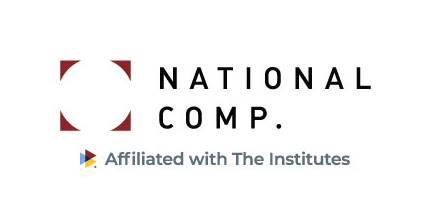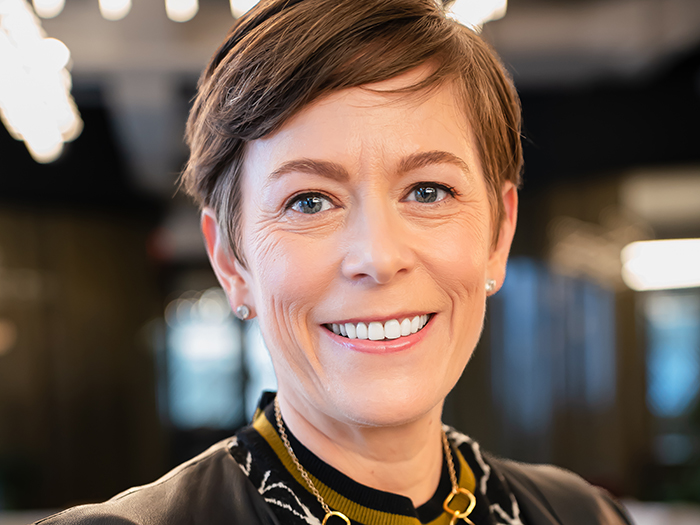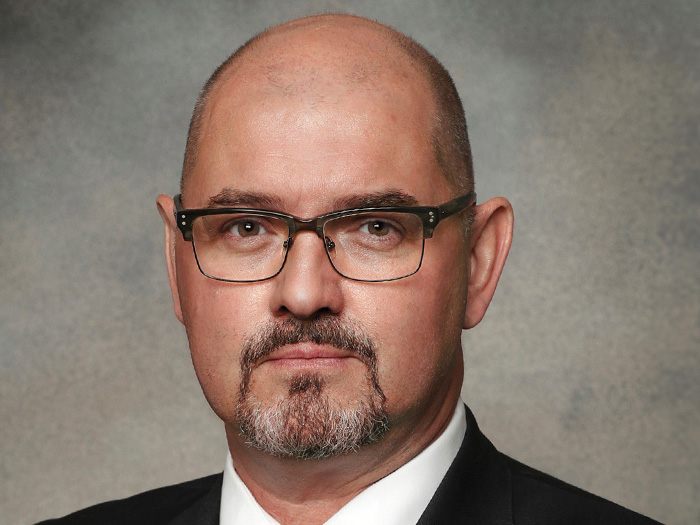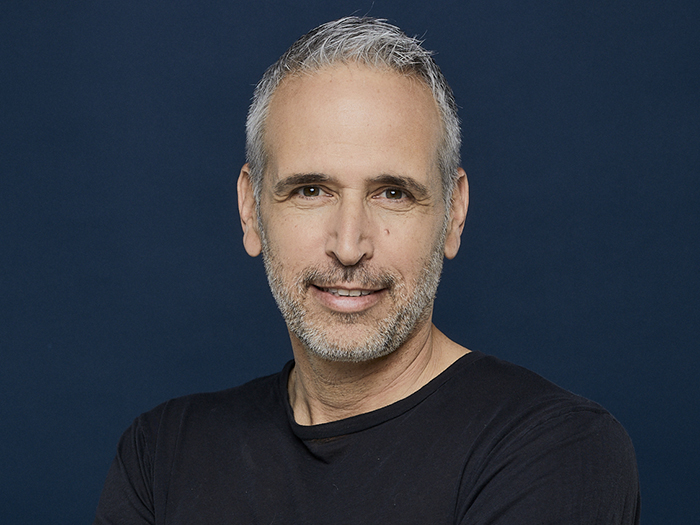National Comp 2023 Spotlights the Female Leaders in Workers’ Comp

The workers’ compensation industry is no stranger to strong leaders.
It takes someone who possesses dedication, perseverance and heart to enter into a field where injury and insurance collide — because workers’ comp is not just about the policies; it’s about the people, the workers, the ones who are facing hardship beyond imagination.
But what makes a good leader?
National Comp 2023 aims to answer that question during Friday’s session “Women Leaders Across the Industry: Optimizing Results Through Innovation.”
Session panelists Caryn Siebert, VP, carrier engagement at Gallagher Bassett; Jennifer Morris Jones, attorney, Cranfill Sumner LLP; Jodi Loud, home office resolution consultant and brain and spinal cord injury specialist, The Hartford; Michele Maffei, director of workers’ compensation, Publix Super Markets; and Caty Wynn, senior global claims analyst, Whole Foods sat down with Risk & Insurance® to discuss the ins and outs of leadership in workers’ comp, giving National Comp attendees a taste of what to expect at this exciting session.
Below is a Q&A roundtable with the panelists, edited for clarity and length.
Risk & Insurance: You’ll be presenting at National Comp 2023 in a panel focused on leadership. What qualities would you say make up a good leader?
Caryn Siebert: Every leader brings her or his own qualities, [so] I’ll go with selflessness in promoting others more than themselves and courage, especially leading during tough times.
Good leaders realize it’s a reflection of themselves when their teams are inspired and successful in helping clients, colleagues and community thrive.
Jennifer Morris Jones: There is no one way or right way to be a good leader and succeed, but our panelists will discuss the importance of being your authentic self, continuing to grow and innovate, learning from mistakes, and showing up to achieve any leadership goal.
It is vital to lead with authenticity, respect and fairness.
R&I: What are some of the trends that leaders in workers’ compensation need to be keeping an eye on?
JMJ: We need to keep an eye on technological advancements such as artificial intelligence, which is being explored and implemented to improve safety at work, make claims management more efficient and predict litigation risk.
That, coupled with the loss of talent in all aspects of the industry as a result of the “Great Resignation,” are both an opportunity and a threat.
R&I: Looking at these trends, how are they influencing how the industry approaches injured worker care?
CS: One of the trends we’ve seen is injured workers doing more self-service. For example, rather than wait to get something in the mail or waiting to get a check or waiting to receive their debit card, they have apps.
Interestingly, before COVID, the leadership team at Gallagher Bassett had already made a conscientious decision to allow over 60% of our employees to work remotely and started utilizing telemedicine and launched an app called GBGO.
Thus, while others were first developing their tools during the past three years, we were taking ours to the next level. [Injured workers] can go on the app, they can see their doctor’s appointment, and they can put in a ZIP code and find a physical therapy office nearby. They can schedule their own telemedicine appointment.
Another trend is wearable technology that’s helping the injured worker in terms of monitoring things like proper lifting techniques, prosthetics and apps where they can actually see how many steps they’re taking. They can monitor their blood pressure and see what their diet is for the particular day.
All these tools to help them get to recovery faster.
And ultimately that’s our goal, to return injured workers back to a point where they can either get back to work fully or get to work partially with accommodations and go back to their pre-injury status, if possible.
R&I: How has technology changed leadership’s approach, if at all? What can leaders do to embrace that change?
Jodi Loud: Remember the interactions at the old water cooler and bring that into your computer interactions.
Take a minute to say hello or ask about each other’s day.
Pause for a moment before jumping subjects or moving on so that social actions can take hold.
It is far too easy to pop in and out of a virtual meeting as a ‘robot on a task’ as opposed to true ‘people in a room’ in a relationship.
CS: Our agile workforce strategy continues to enable us to attract employees from all parts of the country with various personal situations (caregiving for parents, being parents of school-age children, having limited transportation options for tackling a commute, etc.).
Embracing this change and leading these teams requires everyone, especially leaders, to be more flexible, pay closer attention to boundaries and utilize varying communication tools for connectivity and engagement.
I am on the Steering Committee for GB’s DE&I group, Include@GB, through which we have a network of hundreds of colleagues across North America engaging in virtual events, such as unconscious bias training, choirs, cooking demonstrations, trivia contests and reading groups. Our mentorship program is broader and stronger than ever, utilizing technology like Teams for virtual meet-ups.
As colleagues and leaders, our employee inclusion and belonging scores continue to improve as we listen to what our workforce needs to be successful in the new normal.
R&I: What are some of the challenges that women leaders, in particular, have to overcome? Do you have any tips on how to approach biases and adversity?
Michelle Maffei: While the insurance C-Suite continues to be dominated by men, there have been many women who have been able to break that ceiling.
The women of workers’ compensation have really rallied together to support each other through these types of panels, participating in the Alliance of Women in Workers’ Compensation (AWWC) and other networking channels.
Caty Wynn: The pandemic allowed us time to shift and refocus on what we are doing right, what we can do differently, how can we support better and provide meaningful work that meets our business needs.
It is imperative to continue that momentum through resiliently encouraging and empowering each other as we work together for the good of all those in the workers’ compensation industry.
JMJ: As there are fewer women leaders than men in the C-Suite and the top jobs of a company — presidents and senior VPs, as well as law firm managing partners, management committee members and equity partners — women leaders may face challenges like developing support networks, building rapport and securing the necessary support and ‘buy in’ to change business/industry culture.
This could be the way the work is performed, along with overcoming biases and even internal imposter syndrome.
It is vital to lead with authenticity, respect and fairness while remembering that determination, perseverance and patience can go a long way too.
CS: Pre-COVID, having women lift one another up was gaining traction but still a challenge. But, ironically, COVID and technology have enabled many women to shine in the industry.
When COVID hit, we had to live and work differently. Most professionals didn’t have to commute or travel for work, instead converting their dining room area into a makeshift office.
And while this time back allowed us to focus more on our work and family, sometimes seeing the two collide with pets and family members making appearances in our video conferences, COVID certainly presented a challenge for parents who had to balance their careers and family.
For women specifically, they had to be mothers, daughters, spouses/partners, community members and businesswomen simultaneously.
But in the business setting during COVID, everyone was a small box on a computer monitor, so location or proximity to the C-Suite and who you had “access” to wasn’t critical to success. With amazing tools, online newsletters, and Gallagher Basset’s claims metrics dashboard called ROSCO, we continued capturing results and accolades regardless of location.
Geared toward enabling, achieving, recognizing and tracking superior outcomes, these tools demonstrated that about 70% or more of the great stories involved our fabulous female colleagues engaging with injured workers and our clients, being mentors or mentees, volunteering in the community, and successfully supervising claims, service, analytics, and sales professionals.
R&I: What’s the main lesson you hope attendees will take away from your presentation at National Comp?
CW: During the pandemic, grocery employees became “essential workers,” and our jobs all shifted. We spent a lot of time asking ourselves, “How can we help?”
As we shift out of the pandemic and compare “what is different now” and “what lessons did we learn,” we realize we still have the same issue, but we are able to provide additional support to them due to technology. Our focus in workers’ compensation should always be, first and foremost, our employees and their road to recovery.
Providing them with as much support as we possibly can, especially during a time of insecurity and uncertainty, should be our priority. Foreseeing and finding solutions to the questions that run through many injured workers’ minds, such as who is my resolution manager, will my claim be accepted, when will I receive a check, will I be able to provide for my family, ultimately taking away the most important focus — which is recovery — is key.
My hope is that the takeaway from this topic would be employers, TPAs and carriers look for every opportunity to support our employees through the process. We hear the statement all the time that “knowledge is power,” and we can empower our injured employees by providing them with tools to make their claim run smoothly.
Taking away the worries and allowing the injured worker to focus on recovery will ultimately decrease your legal spending and reduce litigation, decrease your indemnity spending due to early return to work, which in turn will ultimately promote healing, both mentally and physically. It is a win for all.
This is why all of these ladies on this panel are here — it is our passion to strive for the best outcome for all involved. We have different paths in the same field but all share the same journey. &
Ed. Note: Michele Maffei will be unable to participate in the Sept. 21 panel at National Comp. The panel will be joined by Sheri Lawrence, Risk Manager, SoCalGas.
 “Women Leaders Across the Industry: Optimizing Results Through Innovation” will be held on Sept. 22 at 10 a.m. Learn more here.
“Women Leaders Across the Industry: Optimizing Results Through Innovation” will be held on Sept. 22 at 10 a.m. Learn more here.










